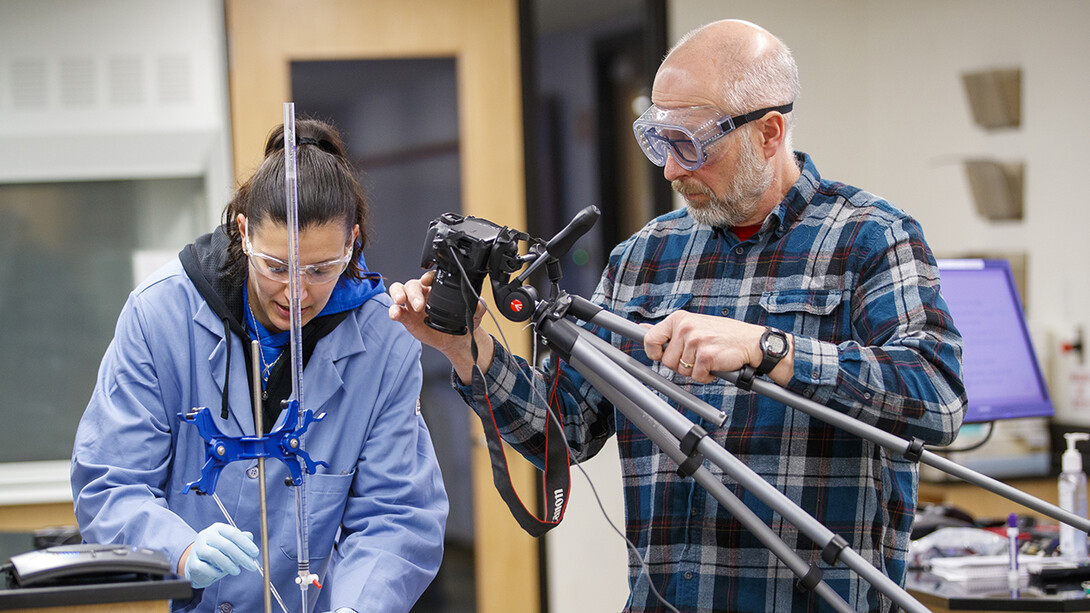
Two weeks ago, University of Nebraska–Lincoln faculty became students.
Answering Chancellor Ronnie Green’s unprecedented call to shift all coursework to remote instruction due to the threat of COVID-19, faculty went to work, learning new technologies and adapting syllabi to deliver spring semester lessons. Their successes will help Huskers continue unimpeded toward coursework completion and graduation.
As the university approaches the launch of remote instruction on March 30, Nebraska Today checked in with faculty across disciplines to showcase their work to maintain teaching continuity in this interrupted spring semester.
Jessica Periago | Chemistry
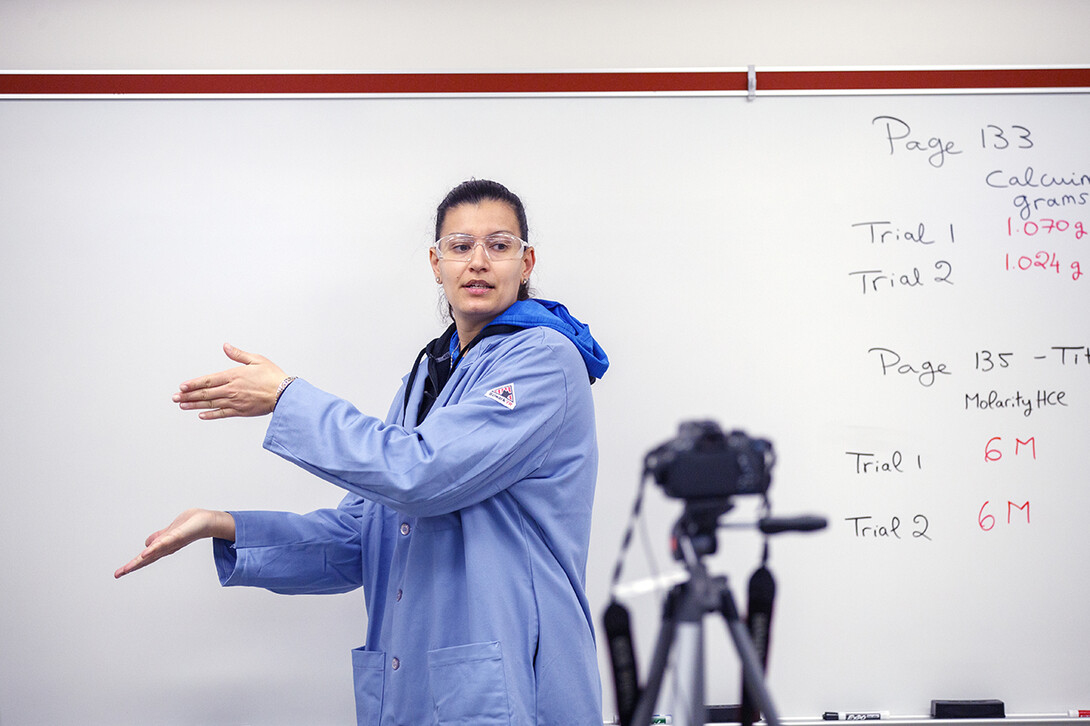
In preparation for remote instruction, chemistry instructors at the University of Nebraska–Lincoln rolled up their lab coat sleeves and found a creative replacement to hands-on learning.
Beginning March 19, the instructors rented video equipment and started filming experiments for students ahead of time. The videos will replace the lab portion of chemistry courses at the university.
“We were able to get some equipment from the library so that we have a decent quality of recording,” said Jessica Periago, lab manager in the Department of Chemistry. “Either myself or some of the TA’s are in front of the camera presenting the experiment as we would normally in a lab setting. We’re recording ourselves doing the experiments for the students, so that way they can watch it at home.”
Kurt Wulser, electronics technician in the chemistry department, played a major role in the filming of the videos. Wulser has helped Periago get the right amount of detail in each shot — and while it’s not perfect every time, it’s still a great way for students to learn.
“What we're going to show them is the first shot,” Periago said. “Some of the time we do make mistakes, and we're like, ‘Okay, can you guys at home tell me what went wrong?’ We're trying to keep it as close to the real experience as possible.”
Periago said that all members of the department are chipping in, while maintaining proper social distancing.
“It takes a village, and we definitely have a village. I feel very fortunate to be a part of the chemistry department, with people just asking, ‘Hey, what can I do to help?’” Periago said.
— Lindsey Amen | University Communication
Ari Kohen | Political Science
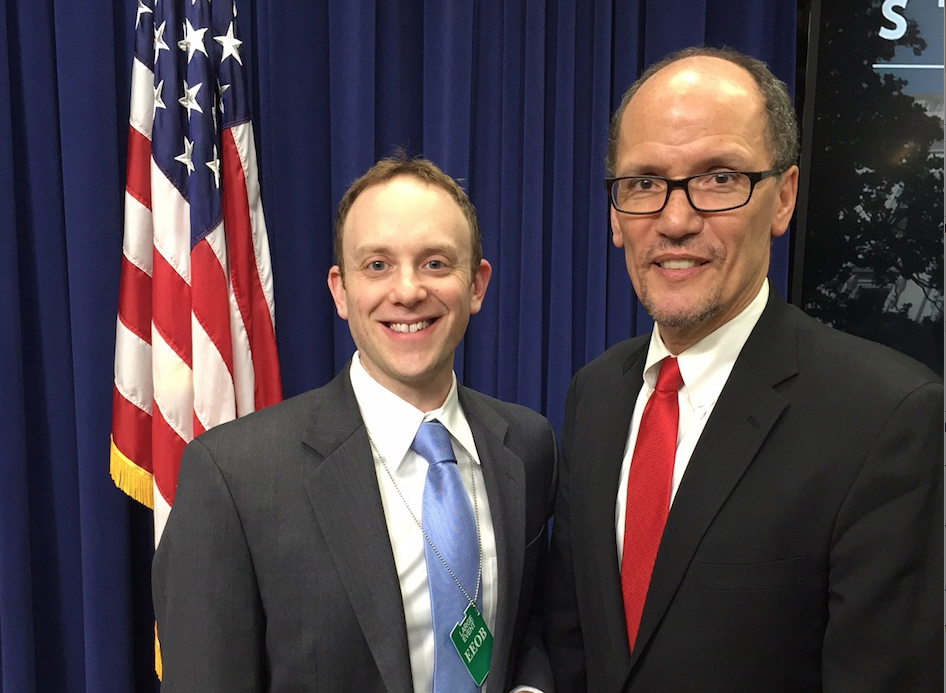
Flexibility is the watchword.
As Ari Kohen, Schlesinger Associate Professor of Political Science, prepares to take his undergraduate and graduate seminar classes into the virtual world, he’s giving his students — and himself — some leeway.
“I’m trying to be as flexible as I can,” he said. “There are a lot of things students are experiencing that are out of their control. If they can't make it to a class, I want to find a way to make sure that they're not missing that material.
“And I’m going to need flexibility from them as we work through this.”
Kohen purchased a web cam and microphone and familiarized himself even further with Zoom. Kohen is planning on delivering his seminars to students in real time, complete with robust discussions through the platform, but he’ll also record sessions for playback later if students can’t join in during class time.
In an effort to practice, Kohen reached out on his social media platforms offering high schoolers four virtual lessons on heroism through the lenses of Greek epics and comic book superheroes. He delivered those classes through Outschool, which also uses Zoom.
“It was a good way to test Zoom as a platform for me to use in a large-group setting, and to test my comfort level with a microphone and a web camera and my setup with my notes and books that I’m using in my classes,” Kohen said.
One of the most important things Kohen learned is that he’ll need to monitor how he speaks.
“By the end of a one-hour class, my throat was sore,” he said. “I’ll have to remind myself that I’m holding a microphone and don’t need to speak as loud.”
— Deann Gayman | University Communication
Just for kicks, I decided to create a 1 hour course on heroism in the Marvel Cinematic Universe and offer it to students who are out of school. It filled up completely with high schoolers...so I'm doing another section of it on Monday. Tell your friends.https://t.co/hVPKnj2TQE
— Ari Kohen (@kohenari) March 26, 2020
Judy Wu-Smart | Entomology and Nebraska Extension
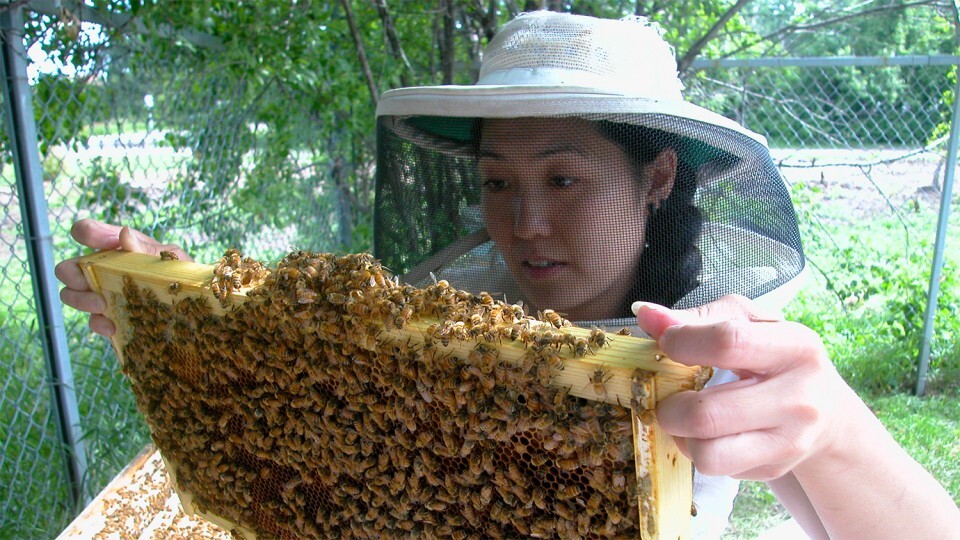
Judy Wu-Smart found many silver linings from a challenging situation.
Faced with the choice of cancelling or proceeding with a beekeeping workshop already scheduled, but ahead of the deadline to put all classes online, Wu-Smart and her team came up with innovative ways to hold the workshop virtually.
“We didn't want to cancel it because the bees are coming — Spring is coming,” Wu-Smart, assistant professor of entomology and Nebraska Extension specialist, said. “The bees don't care the virus is here or not, and beekeepers are going to need that education and those resources.”
Wu-Smart and her team pre-recorded a few lessons on smartphones and used Zoom to hold the all-day workshop March 16.
“There were certainly challenges, such as making sure the technology worked and troubleshooting,” Wu-Smart said. “Surprisingly, I thought that the virtual platform had a lot of benefits that weren't apparent to me at the at the start.”
Wu-Smart said the chat function in Zoom allowed for lively discussion and doing the virtual workshop allowed additional people to learn.
“The participants set it up in the living room, and we were able to have more family members participate,” she said. “There were a lot more people who were able to learn, including out-of-state beekeepers, and to us, it was an opportunity to gain greater reach.”
Wu-Smart has since done a second beekeeping workshop virtually for more advanced beekeepers, and is working out additional ideas for the rest of her spring workshops.
“We’re following up in April to do part two of these courses, which is the field training and practical application of the skills taught in the previous course,” Wu-Smart said. “That will be a little bit more challenging. It will probably be a mix of live chats and pre-recordings, as well as some live demonstrations. We're currently in the process of determining what kind of audio equipment we need, as well as hardware to get the audio to work in the field and in our apiary locations.”
The team's leap to remote instruction was featured in the Lincoln Journal-Star.
— Deann Gayman | University Communication
David Woodman | Biological Sciences
For many undergraduate students at Nebraska, education doesn’t get more hands-on than a human anatomy or physiology lab in the School of Biological Sciences. Whether examining a human cadaver or monitoring blood pressure and heart rate, students naturally learn much about the structure and function of the human body by interacting with one.
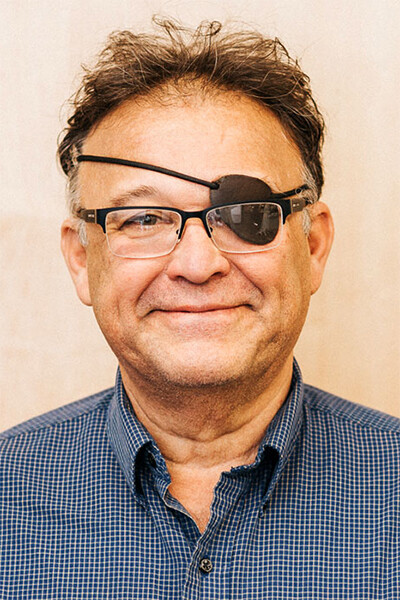
David Woodman, professor of practice of biological sciences, has collaborated with his teaching assistants over the past two weeks to approximate those lab opportunities as best they can through remote instruction.
The instructors will ask physiology students to continue taking whatever measurements they can manage to from home. But because the students will lack access to respirometers, electrocardiographs and other instruments available in Manter Hall, Woodman’s teaching assistants have been busy performing and video recording some of the more technical activities that students would typically be tasked with doing.
By taking screen-captures of the resulting graphical data and creating spreadsheets of the numerical data, the instructors are aiming to present students with roughly the same opportunities for analysis and critical thinking that they received in the lab prior to the COVID-19 outbreak. Woodman’s group also received funding to purchase software that can simulate some of the fundamental physiological phenomena that students are expected to understand by semester’s end.
“This software allows us to study muscle contraction, nerve conduction, cardiac function (and the like) by virtually manipulating variables like we would in a regular laboratory session,” Woodman said. “It will eventually be server-based and accessible to the students so that they can conduct directed, interactive ‘experiments.’ My experience with the trial version has been very satisfying, and we can take advantage of many of its functionalities as early as next week, when the students return from spring break.”
Video-based mini-lessons, a digital anatomy atlas and other resources will likewise stand in for the experience of working with human cadavers, which the University of Nebraska Medical Center loans out each semester.
“We are trying to recreate the original learning experiences as well as possible,” said Woodman, who emphasized that lab instructors will also continue offering office hours through Zoom. “And we are clearly indicating to the students what needs to be learnt, and how they will be tested, to be as fair to them as possible in these difficult circumstances.”
— Scott Schrage | University Communication
Diane Barger | Music
Diane Barger | Courtesy Diane Barger's plans to use her home studio to lead remote instruction during the spring semester.Lessons learned in previous online teaching are helping Diane Barger shift one-on-one clarinet instruction to remote teaching.
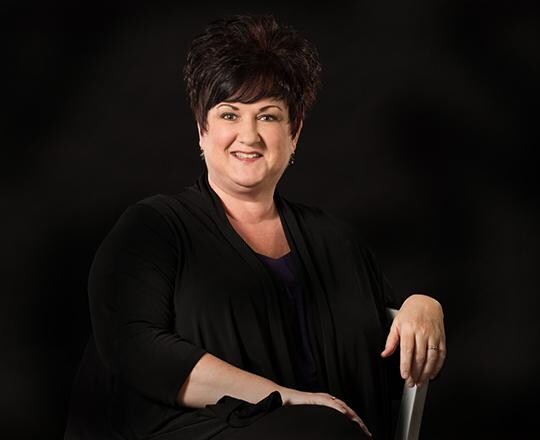
Armed with a trusty iPad, an external microphone and some good headphones, the professor of music plans to use Zoom (or other remote conferencing options) and Facebook to keep instruction moving forward.
“My plan is to make this as close to one-on-one, in-person instruction as possible,” Barger said. “I’ve been working with students online for many years. I know there are no guarantees, but I feel we’re as ready as we can be.”
For nearly 11 years, Barger has been using Facebook’s private group option to manage critiques of works performed by students in her clarinet studio. The students post snippets of their playing, allowing Barger and other classmates to offer feedback.
“That’s been a pretty good resource for my students in terms of strengthening their playing and in their ability to provide critiques of others,” Barger said. “We will be working together regularly via Zoom, but also continuing with the Facebook critiques.”
Barger has, through Zoom, started offering complimentary 30-minute lessons to any middle- or high-school student statewide. In a recent lesson, she was able to help an 8th grader from Fillmore diagnose a problem with a clarinet and instruct how to hit altissimo notes.
“By the end of the lesson, she hit those notes and had a huge smile on her face,” Barger said. “I know we’ll have some glitches and screens freezing, but, hopefully, we’ll have similar positive outcomes as we transition to remote teaching next week.”
— Troy Fedderson | University Communication
Majid Nabavi | Supply chain management and analytics
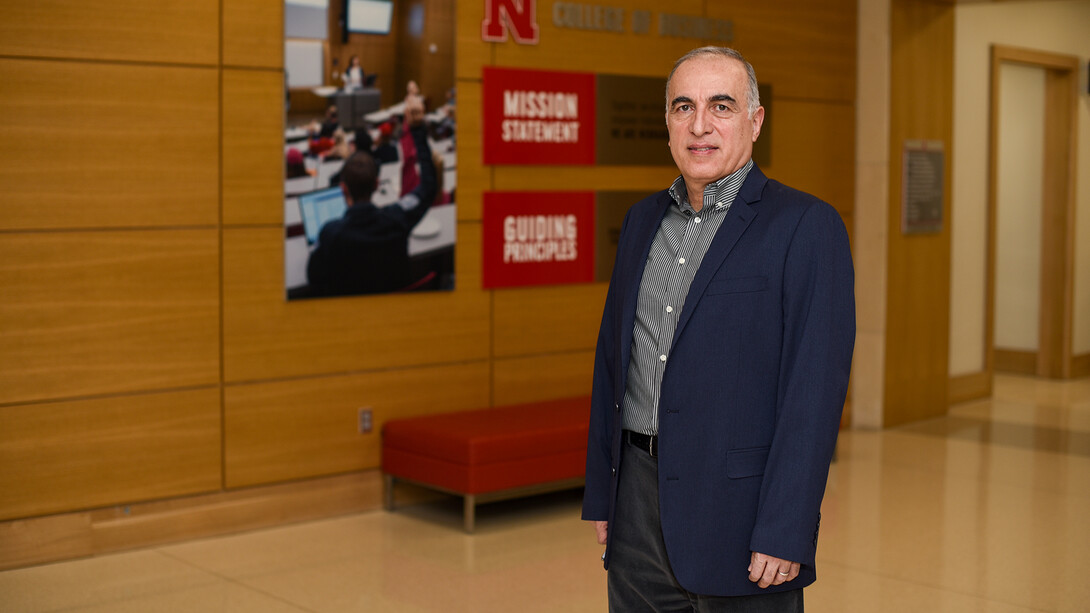
With 13 years of leading online course instruction, Majid Nabavi easily shelved concerns about the university’s shift to remote learning and turned his attention toward student supports.
As other instructors adjusted syllabi and explored digital classroom options, Nabavi pivoted, sending his students emails and offering them a chance to meet via Zoom and experience online discussion boards. The sessions — which featured no new material and were held during regular class times — were optional and designed to give students a opportunity to experience remote teaching.
“To me, the challenge of classes switching to remote instruction is we have a group of undergraduates who have not signed up for this kind of learning,” Nabavi said. “Most have not experienced online classes, so I thought these two weeks would be a good time to explain how it works.”
A handful of Huskers “attended” each session, interacting with fellow students, asking questions and reviewing material presented during the start of the semester.
“The sessions worked out really well and I feel students who participated are ready for remote instruction,” Nabavi said. “But, moving forward, we need to all be aware that some students will have trouble with this transition. Helping them remain on course toward a degree will be a challenge and something all instructors must be ready to address.”
— Troy Fedderson | University Communication
Kat Krutak | Geography, Anthropology and Global Studies
Just facilitated my first PhD defense via Zoom. Phew!!! Successful on all fronts! Congrats to Dr. Husa on this huge accomplishment!!! @HuskerHusa @UNLGeography @UNLincoln @zoom_us pic.twitter.com/coplb4WJsO
— Kat Krutak (@KatKrutak) March 20, 2020
After three years of hard work, Andrew Husa earned his doctorate in geography on March 20.
Husa’s doctoral defense looked a little different than most, as he delivered the presentation — one of the most important in his career — to faculty and department representatives remotely via Zoom.
“I think the hardest thing was not being able to celebrate with the professors,” Husa said. “I’ve worked with them a lot over the years, and I’m really close with them. It was great to talk to them over the computer, but pretty hard to not have them there.”
Kat Krutak, unit coordinator for geography, anthropology and global studies, was one of the facilitators for Husa’s remote defense.
“I would say that we were all a little apprehensive, especially the student and I — because although I've used Zoom to join meetings, I've never used it as a presentation tool,” Krutak said. “So, I consulted Dr. Google and ran through some testing in different video conference rooms. I'd say one of my biggest stress points was our streaming. I was worried that he would cut in and out, or that the audio wouldn't be loud enough, so I was just working through those sort of factors.”
Krutak said that despite those challenges, Husa’s defense went off without a hitch — and they plan to continue using the technology for as long as necessary.
“It's important that, no matter the delivery method, our students can also present their content very clearly,” Krutak said. “This was the biggest day of his academic career, so we wanted to make sure that it was fair and sufficient both to the student and his committee.”
— Lindsey Amen | University Communication
Larkin Powell | Agricultural Sciences and Natural Resources
I put a tie on to make my Welcome Back video for my grad class today. pic.twitter.com/3A06CMbtVA
— Larkin P(@LarkinPowell) March 25, 2020
Larkin Powell injected a bit of humor — and some seriously questionable ventriloquist skills — in his prep for remote teaching.
Through a series of light-hearted, 90(ish)-second videos, the interim associate dean and professor in the College of Agricultural Sciences and Natural Resources, outlined best practices for teaching online and how to readily organize related materials.
“As a faculty member, I saw the large number of long emails that were starting to overflow my inbox — all sent with the best intentions to help people make this historically unique, simultaneous leap to remote teaching,” Powell said. “I thought some quick videos, aimed at the most basic topics, might be useful to my colleagues.
“And, to be honest, the videos helped me sort things out as well.”
The “1.5-Minute Teaching” videos launched March 19 with an overview of how to use backward design to restructure lesson plans. Other topics include transitioning lab courses online and best practices for exams. The series even took a "formal" turn on March 26 as Powell donned a tie for a graduate student welcome back message.
Powell has also spent the last two weeks working directly with colleagues, finalizing plans to serve as a guest lecturer.
“I think we have a good plan for those,” Powell said. “It has been fairly inspiring to watch the general calmness of my colleagues during the past two weeks.”
Explore Powell’s video series via YouTube or by clicking the tweet below.
— Troy Fedderson | University Communication
Starting a new video series today: 1.5-minute Teaching. Follow to see updates everyday with quick ideas to implement. Comment for topics you'd like to see covered.
Today: Backward Design to restructure what's left of your course https://t.co/aOFKoLYhhS #COVID19 #TeachingOnline— Larkin P (@LarkinPowell) March 19, 2020
During the remainder of the spring semester, the Nebraska Today team will highlight the innovative and successful methods campus instructors are using to shift to remote access coursework. If you have a story worth sharing or know of a colleague using innovative methods to instruct students, send email to tfedderson@unl.edu or call 402-472-8515.







